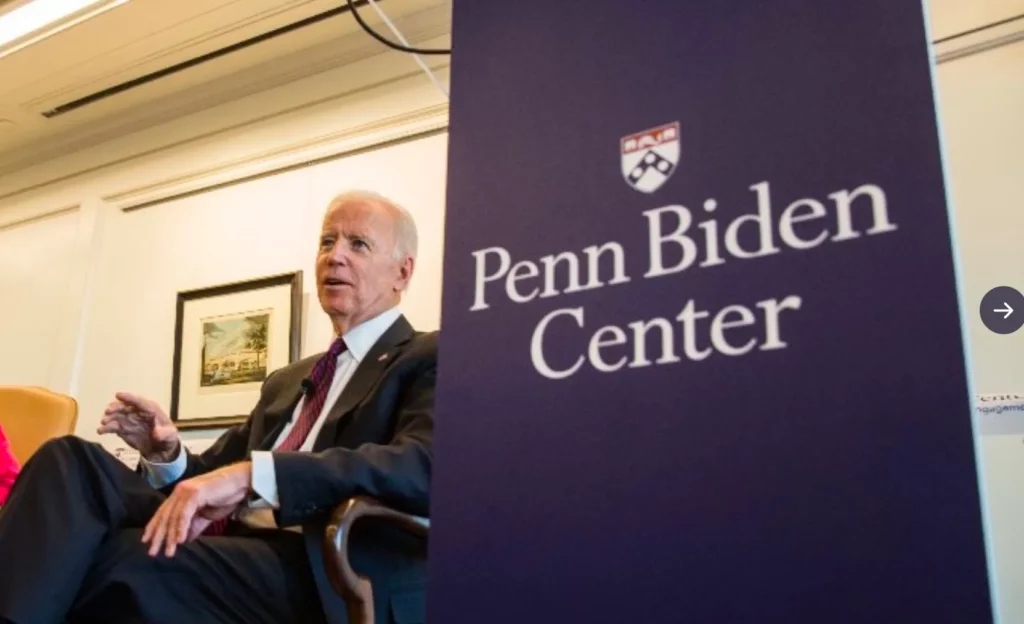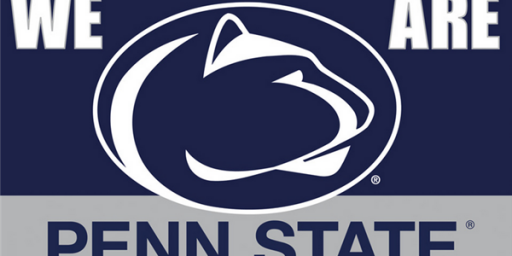Ivy Ressentiment
Old men still bitter about where they went to college.

At TNR, Walter Shapiro tsks tsks at “Biden’s Ivy League Problem.”
Long story short, Joe Biden, who is the only Democratic Presidential nominee in decades without at least one Ivy League degree, helped one of his granddaughters get into Penn while he was a private citizen.
Shapiro admits,
In a world of overhyped fake scandals—where everything is the greatest outrage since Aaron Burr killed Alexander Hamilton—this is a nothing-burger. Many politically connected parents or grandparents have put a thumb on the scale in the effort to score an edge at a prestigious college.
But pivots to
But still, even after adding all the context in the world, this is not a good look for the president. Perhaps Hunter Biden’s daughter would have gotten into Penn on her merits during the regular admission period, but thanks to Grandpa Joe’s intervention, we will never know. In all likelihood, someone else was denied admission to Penn so there would be a slot for Biden’s granddaughter. For Biden, the incident is a reminder that a great strength (his tragedy-marred love of family) can also be a great weakness (his indulgence for Hunter’s dicey business dealings in Ukraine and China).
Look, I don’t like it. I didn’t like when any number of presidential offspring got highly visible, well-paying jobs right out of school almost entirely on the basis of their fame and connections. I especially didn’t like it when Hunter Biden got lucrative foreign lobbying jobs solely on the basis of his perceived influence over his father, then the sitting Vice President. Comparatively, his schmoozing the admissions dean to let Hunter’s daughter into Penn, presumably at the spot of another rich white kid, is minor.
Still, Shapiro isn’t wrong here:
Biden’s intervention with the dean of admissions at Penn also provides a window into the president’s thinking about power and privilege in America. It connects with a story in What It Takes, which was a book that Biden so loved that he spoke at a 2013 memorial service for its author at the Columbia Journalism School. Sometime in the late 1970s, after Biden had been in the Senate for a few years, he was hanging out in a Wilmington backyard with longtime friends. Out of nowhere, Biden began talking about how he had learned in Washington that “there’s a river of power that flows through this country.” With passion in his voice, Biden explained, “Some people—most people—don’t even know the river is there…. And some people, a few, get to swim in the river all the time.” And then Biden moved in for the clincher, “And that river flows from the Ivy League.”
Despite his dedication to returning to Delaware on Amtrak every weekday night so that he could be with his growing sons, Biden also accepted the credo of the Washington elite. Biden made sure that his children would always swim in that Ivy League river of power. Beau Biden attended the University of Pennsylvania as an undergraduate, Hunter Biden received his law degree from Yale, and Ashley Biden earned a master’s degree in social work from Penn. It is an unalterable truth of life in supposedly meritocratic America—the powerful and the connected want to pass their privilege on to their progeny. And, as Biden recognized nearly a half-century ago, the Ivy League and a few similar schools embody the yellow brick road in America.
Still, I don’t see this as a “problem” for Biden. He resents the fact that others had advantages that he didn’t have. And he’s making damn sure his children and grandchildren have those advantages because, By God, he’s earned his way into the elite the hard way.
Mildy ironic? I suppose. But hardly scandalous.
An aside: Granting that he went to school over half a century ago, the idea that Delaware (a state flagship, R1 university) and Syracuse Law (a fairly selective private institution) are somehow indications of a hardscrabble existence amuses me. It’s true that a kid with a C average at UD likely wouldn’t get into Syracuse Law now. But, again, it’s a very different era.
At any rate, Shapiro doesn’t seem to be mad at Biden at all. If you read far enough, you get to this:
Colorful Texas Democrat Jim Hightower got it right at the 1988 Democratic convention when he declared that Vice President George H.W. Bush “was born on third base [and] thought he had hit a triple.” In late 1999, when his son, Texas Governor George W. Bush, was running for president, The New Yorker published his Yale transcript. Interviewing Bush the following week aboard his campaign plane, I whipped out a tear-sheet from The New Yorker as I asked the third-generation Yale graduate about his 71 percent freshman grade in political science. Bush squinted at the transcript and noted with pride, “Twelve hundred college boards. Not half bad.” And then he looked at me, his fellow baby boomer, and said with an edge in his voice, “But I bet you did better, Shapiro.” My response: “Yes, I did, Governor. But I didn’t get into Yale.”
(Full disclosure about the allure of the Ivies: I’ve now spent the past decade as a lecturer in political science at Yale, based on my University of Michigan education.)
While there’s no question the elder Bush had a huge leg up as the scion of an elite New England family (his father would be elected to the US Senate many years later), he was also a star baseball player and WWII hero. I suspect he’d have gotten into Yale, anyway. And—again acknowledging times have changed—Michigan is one of the most prestigious universities in the country.
From time to time, Biden might have used the bully pulpit of the White House to remind Americans how corrosive this obsession with the Ivy League has become for democratic values. This important observation could have built on Jill Biden’s career boosting the virtues of community colleges. The president might have even pointed out that he received a fine education at a public university in Delaware. But instead, Joe from Scranton is like every other anxious parent and grandparent seduced by academic prestige. Something is wrong when even the president believes that in contemporary America you can no longer truly succeed on merit alone.
I’m not sure there’s a society in human history where having money and connections wasn’t advantageous. Beyond that, there’s nothing inherently problematic about going to the Ivies. Why, John Adams went to Harvard and Alexander Hamilton went to what is now Columbia. (It’s true that George Washington and Thomas Jefferson attended public school at William and Mary; but it was equally as prestigious at the time as one of only six colonial colleges.)
We operate on a myth of meritocracy that is not totally without foundation. It’s also true that we actually have less social mobility in this country than in many similarly wealthy countries—not least of which because we have tiered universities that rich people can get their kids into to cement their advantages.



The double standard here is ridiculous.
Trump/Kushner take $2 billion from the Saudis, a toxic plume ravages the Ohio/Pennsylvania border due to deregulation of railroad safety, and the media clutches their pearls about grandpa using his connections to get his grandchild into college.
I’m tired of the Ds being held to a different standard than the Rs – whom we just expect to be corrupt and evil.
This is a bit silly. If we’re going to “go there,” let’s do so for everyone, across the board. This has been happening for ages, and it’s not just the politically connected–it’d be more accurate to say “prominent” because that covers wealth, celebrity, and political connections, all of which grease the skids for plenty of kids. Just look at the recent fussing about acting offspring getting a leg up over others.
My own father missed his first nomination to West Point because some connected kids got the state nominations the year my dad graduated from high school. He later received his nomination/appointment, attended and graduated.
Biden hasn’t done anything diabolical here, like, say, the parents who paid to fake their kids’ way into sports to get into elite schools.
I’ve stared at this headline and am trying to determine if it’s a typo or if I’m missing something.
Should that be “Resentment” or is “Ressentiment” a dig/meme that I’m not getting?? Res-sentiment?
@Jen:
“Ressentiment” means a deep-seated frustration or rage accompanied by feelings of powerlessness.
This is just a presstitute from ‘Even the Liberal New Republic’ taking a good thing and painting it with sh*t so that they can call it bad.
@CSK: Thank you! I’ve learned a new word today. That means I can call it a day, right? 😀
@Jen:
It’s a common usage, especially in the context of political analysis of “Real American’s” attitude towards “elitists.”
I expect Tucker Carlson to make a huge deal of this and blow it all out of proportion…while remaining silent about begging Hunter Biden to help his own daughter get into Berkeley.
The sillyness of our chattering-class is astounding.
This happens all of the time nearly everywhere. It is selectively griped about to go after someone you want to target while ignoring, usually, all of the other times it has been happening.
A couple of observations. First, most of the time the wealthy/powerful person person doesnt have to directly intervene. The name alone does the trick as most of the time schools want to admit these kids. It guarantees future donations. You probably have to be an exceptionally borderline/poor student if it takes direct intervention. Second, it doesnt stop at getting admitted. The important kids get preferential treatment and can afford to make sure they get extra attention. At the group levels the rich and powerful kids can even band together and get teachers to change test dates and lecture schedules so that they can all go to Aruba as a group. (really happened at my Ivy League med school.)
Steve
Yawn…
@charon: Thank you. I vaguely remembered “ressentiment” as a meme from some years ago and couldn’t remember in what context. You’re right, it had to do with MAGA transferring frustration over their own failures to resentment of FOX defined “elites”.
@Tony W: @Barry: Honestly, I think this isn’t Shapiro holding Biden to a higher standard than anyone else but using an anecdote buried deeply in another report as a hook to pound a longstanding grievance.
@Jen: I was racing against the clock this morning. I intended to tie it back into the “Ressentiment Creep” meme from back in the day more explicitly in the closer but didn’t have the time.
@Jen: Shapiro agrees in the piece that this isn’t Varsity Blue level bad. Again, I think he was just using this as a hook to bang a drum. It’s a pretty common pundit tactic.
@Tony W:
I don’t think one dude writing an article hardly anyone will read about a nothingburger hardly anyone will care about qualifies as “the media” clutching their pearls.
I am not an Ivy Leaguer. Not in any way. It has been my lot to engage, here in Silicon Valley, with many of them. Some of them are very good friends, and by and large, I like them. (There’s bad apples in every group, of course).
And yet, I dislike the grip they have on our culture. It is, perhaps, a bit easier to discern ability when the field is scientific, than in, say, law. The great accomplishment of an Ivy League graduate – as compared to a graduate of another institution with similar academic credentials – is not that they got a better education, but that they got admitted (and finished, of course). Ivies screen not just for talent, but also for ambition. Because that created a virtuous cycle of accomplishment by graduates that drove increased demand for admissions.
This allows third parties, who might be hiring, the ability to leverage the very detailed and expensive admissions process at these schools in weeding out candidates.
I get it. But I still don’t like it.
In the bureaucracy, as opposed to the entrepreneurial economy, status credentials matter. And status universities provide a status credential and status network opportunities which led to sinecures maintaining family class status in the bureaus.
But the mystique of an Ivy Degree is manufactured by the maintenance of exclusivity, arrogance, and advantage in gaining positions as a ring-knocker.
Isn’t prestige just one of many things distributed on a curve that has a small number at the far right side of the line? This includes important things like endowments and number of Heisman trophy winners and unimportant things like height of the university president. There will always be outliers in prestige and other things.
BTW, I read somewhere that degrees in STEM fields are increasing at Harvard year by year. Soon you will have to tell hotties that you go to MIT to get a shot with them in Cambridge.
@JKB: “In the bureaucracy, as opposed to the entrepreneurial economy, status credentials matter.”
‘bureacracy’ here means ‘in many, many fields’. The connections are also useful in business.
@JKB:
LOL. Come on, JKB. You think entrepreneurial funding drops out of the sky, with no connections? It doesn’t matter that Bill Gates and Mark Zuckerberg dropped out–where did they go to school? You think that doesn’t matter? Elon Musk went to the Pretoria Boys High School, which literally has an alumni association called the Old Boys network. He also went to Stanford and the University of Pennsylvania.
But do, please go on about how
educationhaving connections doesn’t matter to the entrepreneurial class.@Jen: It is frankly an excercise in playing Don Quixote and Soviet NewManism. Parents and grandparents will act as humans are programmed to act.
Rather more imprtant would be attacking the intergenerational resource inequalities, that is inherited wealth. Although against my class interest, it is the number one thing that must be attacked, taxed away.
@Jen: as a francophone the headline had me read twice, of course an academic import word…
@JKB:
Clearly written by a petit bourgeouis git who is engaging in empty minded ignorant posturing, with an undercurrent of petty status jealousies.
As the founder of three different ongoing enterprises and in venture financing, I can say status credentials matter vastly – they are sometimes diffent ones that the fonctionariat, but as anyone who looks at high-growth venture backed start-up presentations the ostentatious highlighting of high-status credentials (be it MIT or Kaufman or INSAL or les Mines, or INP or whatever is status within the niche) is flagrant, boringly flagrant.
Go maunder on about something you actually know about. Presumbly managing a supermarket or perhaps a regional sales office, perhaps in paper products.
@Jen: He is an idiot. A posturing useless petit bourgeouis idiot.
As I am a proper venture financier…. for all that one gets tired of the badges being slapped on the powerpoint pitchdecks… deep down we are status driven primates and contre best efforts, one is influenced. Of course not uniquely, but it does creep in. Overclocked chimpanzees were are.
@JKB:
Here we see the bitterness and envy that made Trumpism possible in full bloom…
@Lounsbury:
Now, that made me laugh! Thanks.
@Lounsbury: You have no idea at all of how hard it would be for JKB to find something he knows about for maundering purposes, do you?